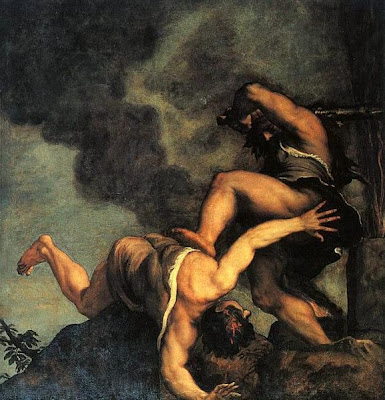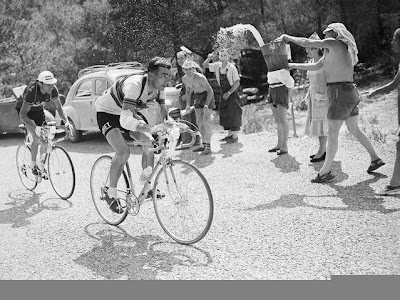It's a Saturday, nearly the last day in July, and according to the kaleidoscopic electronic hotel marquee out along the highway on the eastern edge of town, it's 100 honest-to-god degrees Fahrenheit at noon in Ulysses. (Update: by 5:00 p.m. it was 104 degrees, two hours later, a degree cooler.)
I walked the sidewalk around the lake ("Reclaimed waste water - do not drink or swim") in the municipal park earlier this morning, where I found a smallish three-foot bull snake coiled loosely on the concrete walk in the shade of a tree, as sound asleep as a snake ever gets, a mouse-sized bulge somewhere amidships. It was still there when I returned thirty minutes later. I don't know which I'd rather have tried to eat for breakfast - that mouse or a pretty lively bluegill that a heron was shaking into submission before swallowing entire, a finny little devil that made me wish the heron good luck with that, sucker.
100F - read it and weep
As both images set a certain tone for the morning, I forewent breakfast myself - not to mention that the buffet room at the hotel sported a preternaturally large double-tiered cake stuccoed in opaque white and blue (it's a boyexclamationpoint) frosting while a family group decorated for a baby shower, spangling the place in lavender and white crepe like an Italian funeral. But those are Kansas State's liturgical colors as well, and the parents were evidently hoping to implant prenatally their own loyalties, as western Kansas is rabid (if that's the word I want) Wildcat country. (To the credit of all Kansans everywhere, I have never seen a single bumper sticker that reads, "If God isn't a Wildcat/Jayhawk/Chiefs/Royals fan, then why is the sky blue/grass green/sunsets orange/mud brown/cowshit wrinkled . . . . ?")
Last evening I went over to Sublette for the Haskell County Fair's annual 4-H livestock sale. I went as a buyer, which gave me entree to the "buyer's appreciation dinner" in the fairground's main meeting hall, which was much like an ageing, linoleum-paved church basement with a few windows. I do not mean to disparage the elderly municipal and county buildings in southwestern Kansas, as many of them are now air-conditioned - true oases in the heart of an otherwise furnace-like landscape. The meal was mainly a semi-circle of homegrown steak, large enough that I had to pry a hubcap off a Packard in the parking lot to accommodate it.
1935 Packard (with hubcaps)
The table for beverages was separate, manned (if that's the word I want) by a cadre of tiny 4-H-ers who offered everyone a cup of cold drink - "did you want water? - or tea?" - poured it out, then carried it to your place at the table for you. All through the meal they plied the crowd steadily, like flies in a feedlot, with pitchers of the same - "did you have water? - or tea?" A nice boxed wine, I thought, might have made the livestock bidding to come a bit more brisk.
Four-H livestock auctions, a feature of every county fair, are a way farm kids raise money to finance their animal-rearing ventures and learn the business of animal husbandry. Local businesses bid on the animals, their designated bidders gamely raising the stakes as parents and grandparents conspire against them. Four-H parents are the rural equivalents of suburban Little League or soccer parents, except that since everyone is a neighbor and there's actually money involved they seem much kinder and less grim about it. It's a low-stakes game in which everyone knows one another and understands the rules. I was there to buy any animal that was affordable because the company I work for does business in the county and has always been a good local citizen.
After everyone had eaten and I'd threatened a table of county commissioners and feedlot owners (acquaintances all) that I was only there to drive up the stakes, everyone ambled out to the auction shed, got settled in the metal bleachers, listened to the litany of thank yous from the county agricultural officer, and then the chicken auction commenced. Not poultry - chickens. After one round of chicken bidding I heard a deep whisper behind me (no lie) - "I tell ya, if I was a kid I wouldn't shed a tear over a $600 chicken." I thought, if chickens are bringing that much, what will the beef bring?
I never figured that one out. Fortunately, my friends Katy and Kevin were there as interpreters, cultural emissaries and consiglieres. Their successive generations of offspring have shown and sold 4-H livestock in two milennia and they are versed in the finer points of bidding, judging, buying, selling and raising it. After the chickens were all sold, the rules of calculation became arcane - beef was auctioned "by the hundredweight," which meant some calculation based on the current market value, which dictated the convenient figure of $1.07 per pound as the base price, and (I think) the serious bidders started from there - most of the year and a half old steers were 1400 pounds plus, so add $400-$800 to that).
Pig bidding was different yet (never figured that out either). The pigs on offer displayed some considerable personality, as they were the only animals not haltered and had generally been raised by small humans, who stood only twice as high as their backs and whom they outweighed by a factor of about five. The wee folk control (if that's the word I want) their pigs kindly, with a pointy rod like a long whippy riding crop, but the pigs spend their time either heading back for the chute they entered or trotting for the farther chute they seem to recognize as an exit. They either ignore the auctioneer's vastly amplified machine-gun staccato and loiter along the runway to investigate, or become rapid and agitated and head for the nearest visible exit, which (they generally seem to realize without prompting) may be behind them. They out-man (if that's the word I want) their young handlers with the insouciance that comes of possessing both bulk and brains (occasionally a human attribute as well in the evolutionary scheme of things).
"Perfectly serious, kid - just tell me what you'd like me to do, heh heh."
Kevin and Katy's three-year-old is already famous for showing his pig, Howdy, at 4-H events, as he forsakes the show routine for domestic familiarities, riding Howdy literally piggy-back around the arena. He's only three, but some of the judges take show protocol more seriously than do Howdy and his young handler.
Finally came the goats. Given my meager corporate livestock stipend, Kevin figured the goats were budget paydirt. So, prompted by his whispering "Hold it up!" I held up my numbered bidder's card and bought the first goat from a young lady named Cheyenne for "Four hun-ned dol-lahz!" Which was not quite as much as I had to spend, and which I quickly learned translated as four dollars per pound of goat. As it was an 88-pound goat, I spent about $350 of the company's hard earned money ($400 X .9 = ~$350). I just surrendered the remaining $150 of my allowance at customs.
"Heerd you was holdin' money fer me."





















































